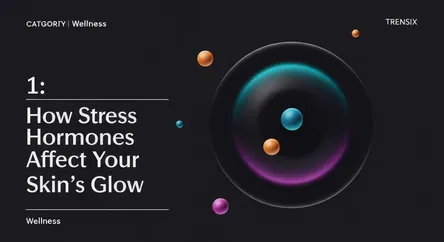Wellness
How Stress Hormones Affect Your Skin's Glow

Understand how cortisol, the primary stress hormone, can impact your skin, leading to acne, wrinkles, and inflammation, and what it means for you.
What is it?
Cortisol is the body's primary stress hormone, released in response to "fight or flight" situations. When stress becomes chronic, elevated cortisol levels can negatively impact the skin. It triggers the sebaceous glands to produce more oil, which can clog pores and lead to acne breakouts. Chronically high cortisol also accelerates the aging process by breaking down collagen and elastin, the proteins that keep skin firm and youthful, resulting in fine lines and wrinkles. Furthermore, it can weaken the skin's natural barrier, leading to dryness, inflammation, and increased sensitivity.
Why is it trending?
The connection between mental well-being and physical appearance is a major focus in wellness. As awareness of chronic stress grows, people are connecting the dots between their stress levels and skin problems like acne and premature aging. This has led to the rise of "psychodermatology," a field exploring the mind-skin connection. The beauty industry is responding with "anti-stress" skincare products and marketing that emphasizes stress relief as a key component of a healthy skincare routine. This trend aligns with a broader shift towards holistic health, where skincare is seen as part of overall self-care.
How does it affect people?
The effects of high cortisol directly impact an individual's appearance and confidence. People may experience persistent acne breakouts, even outside of their teenage years. They might notice their skin looking dull, dry, or that fine lines and wrinkles are appearing sooner than expected. For those with pre-existing inflammatory skin conditions like eczema, psoriasis, or rosacea, high stress can trigger flare-ups, causing redness, rashes, and discomfort. This connection forces people to not only manage their skin topically but also address underlying stress for healthier, more resilient skin.